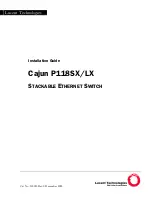
SROS Command Line Interface Reference Guide
Enable Mode Command Set
5991-2114
© Copyright 2007 Hewlett-Packard Development Company, L.P.
71
copy flash
Use the
copy flash
command to copy files located in flash memory to a specified destination. Variations of
this command include:
copy flash
<filename>
cflash
<filename>
copy flash
<filename>
flash
<filename>
copy flash
<filename>
interface
<type> <slot/port>
copy flash
<filename>
startup-config
copy flash
<filename>
tftp
copy flash
<filename>
xmodem
Syntax Description
<filename>
Specifies the name of the file (located on the compact flash card) to copy.
The asterisk (*) can be used as a wildcard to specify a pattern for erasing
multiple files. When a wildcard is specified, only files matching the listed
pattern are copied. When using a wildcard, leave the destination filename
blank because the source files are copied identically (including the
filename) to the destination. You cannot use a wildcard when the
destination is
startup-config
.
cflash
<filename>
Specifies the destination memory location for the file copy as compact
flash memory and the filename.
flash
<filename>
Specifies the destination memory location for the file copy as flash
memory and the filename.
interface
<type> <slot/port>
Specifies copying a software file to a specified interface. This command is
only valid for modules that contain module-specific software that is
independent of the system software. Enter
copy flash XXXX interface ?
to display a list of all available module types.
startup-config
Replaces the primary startup-configuration file with a copy of the specified
file.
tftp
Specifies sending the file using the trivial file transfer protocol (TFTP).
After entering
copy flash XXXX tftp
, the SROS prompts for the following
information:
Address of remote host:
Specifies the IP address of the TFTP server.
Destination filename:
Specifies the filename to use when storing the
copied file on the TFTP server. (The file will be
placed in the default directory established by
the TFTP server.)
xmodem
Sends the specified file (using the XMODEM protocol) to the terminal
connected to the
Console
port.
Default Values
No default value necessary for this command.
















































